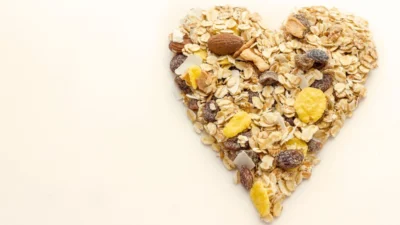Vegan Meat – Healthy or UPF?

Are plant-based meat alternatives healthier than meat? No, according to the meat industry; yes, according to science.
Because of people’s concerns about their health, the environment and animal welfare, meat alternatives have mushroomed – pun intended! Meat-free sausages, burgers, steaks, hot dogs, schnitzels, goujons and nuggets are in every supermarket. Largely aimed at flexitarians, they are designed to mimic the taste and texture of meat for those who want to reduce their meat intake but still get the taste. But are they better for you or worse than their animal-based equivalents? Let science not meat industry marketing be the judge!
Better than the real thing!
Over half of the average UK diet is made up of ultra-processed foods (UPFs) – more than in any other European country and in the US, it’s nearly 60 per cent. Eating lots of UPFs is linked to a higher risk of disease and death, mostly due to foods such as sugary drinks and processed meats. Sausages, hot dogs, chicken nuggets, burgers, bacon and sliced meats … some people can’t get enough of them! But are the vegan alternatives any better?
In a study published in the journal Clinical Nutrition Open Science, Physician, New York Times bestselling author and internationally recognised professional speaker on public health issues, Dr Michael Greger, says plant-based meat alternatives are an exception to the usual UPF rule in that they are generally healthier than the foods they’re designed to replace, with more nutrients, fewer calories and more beneficial plant compounds. Greger says: “Rather than contributing to the concern, plant-based meats may provide a solution to the UPF problem”.
Plant-based meats can help you feel fuller for longer and may help with weight control and gut health while lowering inflammation. They also come with a reduced cancer risk and better food safety in terms of food poisoning, antibiotic resistance and the industrial pollutants associated with meat. Replacing some meat with plant-based meats could also lower LDL, ‘bad’ cholesterol, potentially saving lives and healthcare costs.
A history lesson
Vegans didn’t invent alternative proteins; people have been eating them for centuries. Traditional meat alternatives include tofu, originally from China, which is made by mixing soya milk with a setting agent such as calcium sulphate. Wash the starch out of wheat flour, cook what’s left and you have wheat gluten – better known as seitan – it has also been used in China for centuries and is rich in protein. Tempeh is fermented soya beancake from Indonesia and is another old stager. All of them provide a wide range of nutritional and health benefits.
The new kids on the block include the packaged meat alternatives such as plant-based sausages, steaks and burgers. In recent years, they have rapidly shifted from niche offerings to supermarket and restaurant staples. Their growing popularity has prompted a response from the meat industry, which is now deploying a range of tactics in an effort to reclaim meat-eating consumers.
Missing nutrients?
The usual arguments focus on ‘missing nutrients’ and levels of processing used in the manufacture of meat alternatives. However, these vegan products often provide protein levels comparable to or higher than meat and many are fortified with vitamin B12, which is increasingly necessary since animal foods (especially pork) now contain less B12 than in the past and deficiency is not uncommon in the UK, regardless of diet.
Iron is present in wholegrains, beans, tofu and some plant-based meats, though not always listed on the labels, but a varied vegan diet typically supplies enough. Most vegan meat alternatives are lower in saturated fat, higher in fibre and have similar salt content to meat.
Vegan meat alternatives have been criticised for containing ingredients you would never find in your kitchen cupboards, such as methylcellulose, for example. Derived from cellulose, it is used as a binder, thickener or emulsifier in many products. Ironically, methylcellulose is widely used in the processed meat and dairy industries!
Meat industry pushback
Online articles attacking plant-based meat and dairy alternatives just keep coming and there is evidence that the meat industry is behind many of them. Research conducted by the Changing Markets Foundation found that one-quarter of all the social media posts they analysed disparaged plant-based meat and dairy by claiming they lack nutrition – ‘ultra-processed,’ ‘Frankenfoods’ that can cause serious disease. It was mostly driven by a small group of social media accounts associated with so-called wellness experts funded by the meat industry or far-right media and political figures.
What the meat industry prefers to skip over is that even low meat consumption is linked to a higher risk of obesity, type 2 diabetes, heart disease and cancer – major causes of death in the UK. The World Health Organisation classifies processed meats such as bacon, ham, hot dogs and sausages as Group 1 carcinogens (known to cause cancer), while red meat is a probable cause of cancer. Meat contains saturated fat, which increases chronic disease risk, and nitrites used as a preservative in bacon can form cancer-causing chemicals when cooked at high heat, as do several other compounds found in meat. Undercooked meat, however, can cause food poisoning and then, of course, there are antibiotic-resistant superbugs and the pandemic threat posed by factory farms. I’ll stick with a veggie sausage thanks!
Last words
Some new-generation meat alternatives can still be relatively healthy eaten in moderation. One study published in the journal Foods compared plant-based mince, burgers, sausages and meatballs from the Meatless Farm company with red meat, poultry, fish, eggs and cheese and after just four weeks, those eating the plant-based foods showed changes in their gut bacteria that the authors said, “may confer significant and wide-ranging health benefits”.
Viva! doesn’t recommend eating lots of processed foods but even so, it’s worth noting that those containing high-quality ingredients can provide health benefits when eaten in moderation. Of course, whole plant foods are still the best but plant-based meats are an exception among UPFs in that they are better than the foods they were designed to replace.







